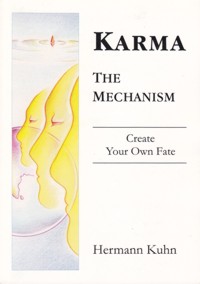
Tatpradosa ninhava matsaryantaraya sadanopaghatajnanadarshana varanayoh (10)
- Rejecting, consciously ignoring or a negative attitude towards knowledge[15]
- withholding knowledge
- refusing to impart knowledge out of envy or jealousy
- obstructing the process of gaining knowledge
- denying truth proclaimed by others although we recognize it as truth and
- discrediting truth although we recognize it as such
attracts karma that prevents our intuition from orienting towards growth (samyag darshana). It also obstructs access to knowledge that advances our development (samyag jnana). (10)
Communicating and explaining true knowledge helps others to become aware of the magnitude of their inner potential. It opens mind and heart to the fact that everyone is capable of freeing himself from restricting influences. And it informs our fellow people of the methods how to reach this goal.
If we spurn this process, maintain a negative attitude towards it or obstruct it intentionally, we mainly block our own access to knowledge - and with this our access to freedom from all karmic limitations.
It is fundamentally impossible to prevent others from gaining knowledge.
The process of gaining knowledge is triggered by the dissolution of karmic blocks inside us. Once these blocks are removed, we gain access to further regions of the complete and perfect knowledge always present within us. After becoming aware of this opening, we begin to explore our - newly available - range of insight intuitively and intellectually. This exploration integrates the (new) knowledge into our consciousness and makes it accessible for practical use.
How and at what time we realize that our consciousness gained access to (new) knowledge depends on inner and outer circumstances. This realization can be triggered by sudden intuitive insight (darshana), by verbal instruction, by reading descriptions of it and other factors. In general it happens when - after the inner opening - conducive conditions are present.[16]
It is entirely impossible to block the initial inner opening. And even the secondary process - our conscious exploration of this opening - may at the utmost be slowed down, but can never be totally barred.
Knowledge never comes from the outside. Every one of us always and permanently carries the source of all knowledge within. Knowledge and our ability to cognize it is one and the same inalienable and basic feature of our consciousness. The fact that we do not perceive this to its fullest at present is caused by our own prejudices, errors, misconceptions and erroneous beliefs what knowledge is all about, how it may be gained and that we already know everything. It is our very own emotional (karmic) attachment to these prejudices that block our access to higher knowledge. Once we remove these blocks, our awareness begins to reach into regions previously inaccessible. Any event at any location may then make us aware of the new range of knowledge available to us.
Imparting and explaining knowledge therefore never 'gives' knowledge to the student. It only makes him aware how much his awareness has opened up to his own inner source. And it may also guide him how to explore this opening and how to dissolve further karmic blocks - the prime cause for his progress.
Any negative attitude - whatever its origin - towards this process creates within us exactly the same type of obstruction we intend to cause in others.
The following types of actions attract karma that blocks our own access to knowledge:
- Rejecting, consciously ignoring or a negative attitude towards knowledge
either felt inwardly or communicated to others.
- Withholding knowledge
means to pretend ignorance as well as intentionally concealing knowledge from someone who is eager to learn.
Concealment of knowledge is often found in hierarchical organizations structured around a central focus (gurus, preachers etc.). Here frequently the argument is heard that artificial barriers in the process of gaining knowledge are necessary because a disciple is deemed 'not ready' for so-called 'higher' knowledge. Yet this reasoning is invalid, arbitrary and keeps the student in intentional subjugation.
The amount and type of knowledge we have access to depends only on how much we open ourselves to our impeccable source of knowledge within. We gain access to this source in the same degree as we remove our deep-seated prejudices, misconceptions and erroneous beliefs - i.e. our karmic obstructions.
We cannot comprehend knowledge that is still blocked by karma. Though present in our consciousness in latent form, it will stay beyond our grasp for as long as we permit our prejudice, pride etc to block access to it. Even though we may formally learn it, we remain incapable of understanding it.
Since the 'maturity' for more ('higher') knowledge depends always and only on the removal of karmic obstructions within the student, it can never be controlled by giving or withholding formal information. And it is always our own decision how intensely we work on removing our prejudices, misconceptions and erroneous beliefs (karma) that stand between knowledge and our comprehension. This process should not be slowed down by the erection of artificial barriers.[17]
- Refusing to impart knowledge out of envy or jealousy - e.g. someone is eager to receive knowledge, but his 'teacher' - i.e. someone in possession of this information - refuses to teach because he fears his disciple might progress faster than he himself.
- Obstructing the process of gaining knowledge (see commentary on withholding).
- Denying truth proclaimed by others although we recognize it as such. This means refuting, slandering, ridiculing and discussing with the intent to destroy the impact and power of knowledge.
Often this type of action is caused by envy that other teachers attract more followers, command deeper insight or have a greater gift of words.
- The attempt to destroy knowledge we recognize as true.
These attitudes and actions affect two areas of life:
- karma that blocks knowledge (jnana) frustrates our conscious perception, reflection, understanding and integration of knowledge.
- karma that hinder us to actively orient towards growth, blocks our intuitive insight (samyag darshana) how to choose the optimal path to freedom from karmic limitations
These two types of karma further interfere with our ability to intuitively discriminate between truth and error.
They also block the use of 'Total Perception'- pramana[18] - for our inner growth. Total Perception is the key to more advanced levels of awareness. It enables us to evaluate the multitude of new impressions we perceive during an expansion of consciousness. It gives us the dreamlike certainty to amplify only those impulses that lead to further expansion.
And then - suddenly - our breakthrough comes. The block is removed, we reach a more comprehensive level of understanding, everything becomes clear and we think: 'How stupid, I didn't see it before'. - Whoever experienced such a breakthrough knows it comes suddenly, with lightening speed, with excitement shooting through us and motivating energy gushing through all our mind and body.
- If this mechanism is known and is kept secret, then it is obvious that knowledge-obstructing karmas operate within the hierarchy.
- If its members are unaware how much of an obstruction they create, the real mechanism of gaining knowledge is not known and thus anything taught can at best be partial.
The very structure of such organizations often prevents their followers from gaining access to their own inner source of complete knowledge - an essential prerequisite for reaching ultimate freedom.
 Hermann Kuhn
Hermann Kuhn
